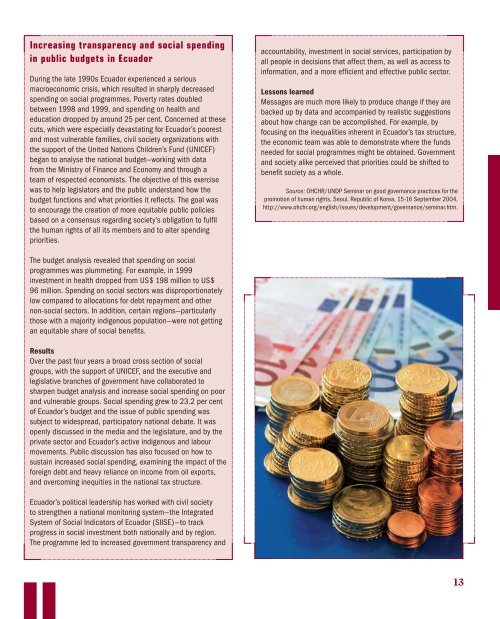Frequently Asked Questions on Human Rights-Based Approach
Frequently Asked Questions on Human Rights-Based Approach
Frequently Asked Questions on Human Rights-Based Approach
- No tags were found...
Create successful ePaper yourself
Turn your PDF publications into a flip-book with our unique Google optimized e-Paper software.
Increasing transparency and social spendingin public budgets in EcuadorDuring the late 1990s Ecuador experienced a seriousmacroec<strong>on</strong>omic crisis, which resulted in sharply decreasedspending <strong>on</strong> social programmes. Poverty rates doubledbetween 1998 and 1999, and spending <strong>on</strong> health andeducati<strong>on</strong> dropped by around 25 per cent. C<strong>on</strong>cerned at thesecuts, which were especially devastating for Ecuador’s poorestand most vulnerable families, civil society organizati<strong>on</strong>s withthe support of the United Nati<strong>on</strong>s Children’s Fund (UNICEF)began to analyse the nati<strong>on</strong>al budget—working with datafrom the Ministry of Finance and Ec<strong>on</strong>omy and through ateam of respected ec<strong>on</strong>omists. The objective of this exercisewas to help legislators and the public understand how thebudget functi<strong>on</strong>s and what priorities it reflects. The goal wasto encourage the creati<strong>on</strong> of more equitable public policiesbased <strong>on</strong> a c<strong>on</strong>sensus regarding society’s obligati<strong>on</strong> to fulfilthe human rights of all its members and to alter spendingpriorities.accountability, investment in social services, participati<strong>on</strong> byall people in decisi<strong>on</strong>s that affect them, as well as access toinformati<strong>on</strong>, and a more efficient and effective public sector.Less<strong>on</strong>s learnedMessages are much more likely to produce change if they arebacked up by data and accompanied by realistic suggesti<strong>on</strong>sabout how change can be accomplished. For example, byfocusing <strong>on</strong> the inequalities inherent in Ecuador’s tax structure,the ec<strong>on</strong>omic team was able to dem<strong>on</strong>strate where the fundsneeded for social programmes might be obtained. Governmentand society alike perceived that priorities could be shifted tobenefit society as a whole.Source: OHCHR/UNDP Seminar <strong>on</strong> good governance practices for thepromoti<strong>on</strong> of human rights, Seoul, Republic of Korea, 15-16 September 2004,http://www.ohchr.org/english/issues/development/governance/seminar.htm.The budget analysis revealed that spending <strong>on</strong> socialprogrammes was plummeting. For example, in 1999investment in health dropped from US$ 198 milli<strong>on</strong> to US$96 milli<strong>on</strong>. Spending <strong>on</strong> social sectors was disproporti<strong>on</strong>atelylow compared to allocati<strong>on</strong>s for debt repayment and othern<strong>on</strong>-social sectors. In additi<strong>on</strong>, certain regi<strong>on</strong>s—particularlythose with a majority indigenous populati<strong>on</strong>—were not gettingan equitable share of social benefits.ResultsOver the past four years a broad cross secti<strong>on</strong> of socialgroups, with the support of UNICEF, and the executive andlegislative branches of government have collaborated tosharpen budget analysis and increase social spending <strong>on</strong> poorand vulnerable groups. Social spending grew to 23.2 per centof Ecuador’s budget and the issue of public spending wassubject to widespread, participatory nati<strong>on</strong>al debate. It wasopenly discussed in the media and the legislature, and by theprivate sector and Ecuador’s active indigenous and labourmovements. Public discussi<strong>on</strong> has also focused <strong>on</strong> how tosustain increased social spending, examining the impact of theforeign debt and heavy reliance <strong>on</strong> income from oil exports,and overcoming inequities in the nati<strong>on</strong>al tax structure.Ecuador’s political leadership has worked with civil societyto strengthen a nati<strong>on</strong>al m<strong>on</strong>itoring system—the IntegratedSystem of Social Indicators of Ecuador (SIISE)—to trackprogress in social investment both nati<strong>on</strong>ally and by regi<strong>on</strong>.The programme led to increased government transparency and13
















